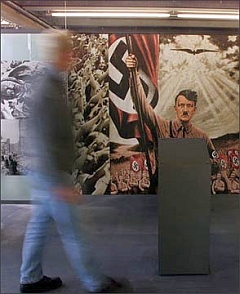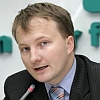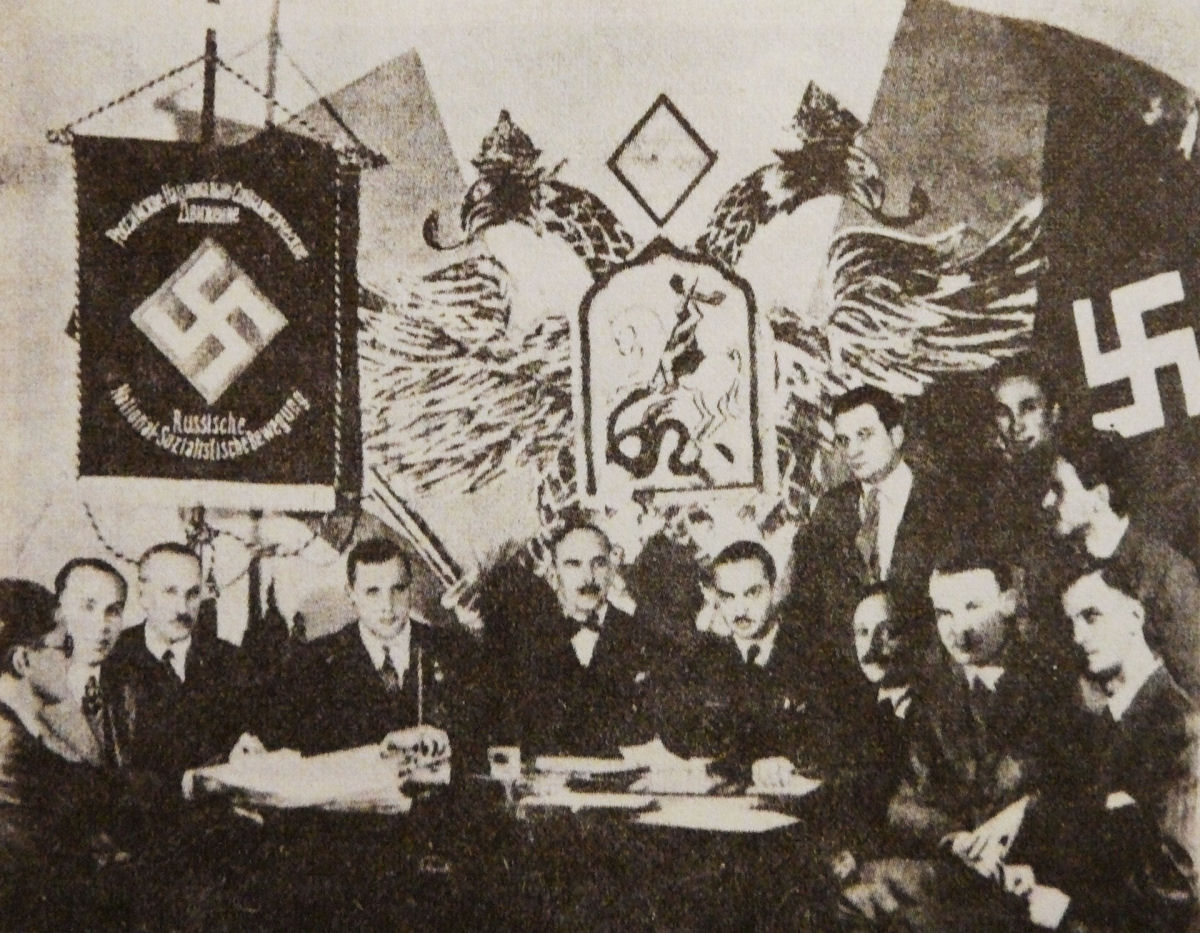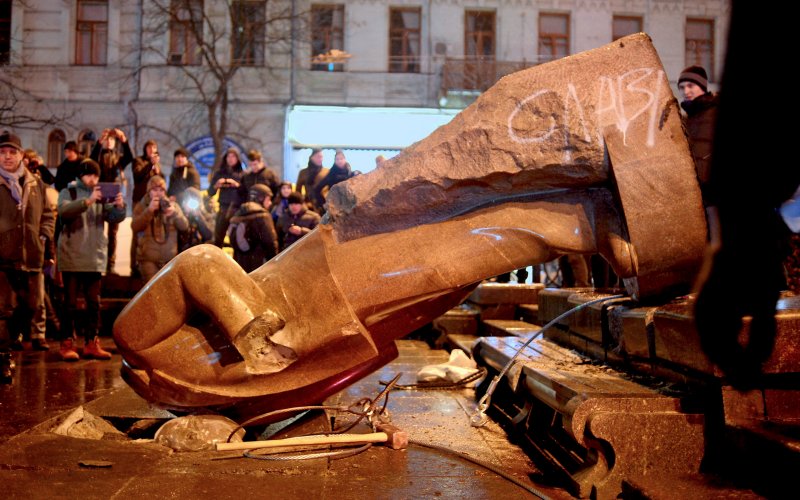 Oleksandr Paliy for UP Tuesday, September 1, 2009, 12:01
Oleksandr Paliy for UP Tuesday, September 1, 2009, 12:01
When the current Russian government throws angry accusations of “accomplices to Nazism", it should have first removed the plank from its own eye.
One could start with the fact that through the SS Division "Galicia", which was indeed formed as a collaborating military force, came through barely 22 thousand Ukrainians. At the same time, the collaborationist formation of Russian "Vlasovs" alone numbered from 0.5 to 0.8 million Russians, and their membership at the end of the war exceeded 120,000 people. This occurred despite the fact that the entire territory of Ukraine was fully occupied by the Fascists, while only a small western part of Russia suffered occupation.
Even more indicative is the so-called “Molotov-Ribbentrop Pact” - a fact of not merely private and individual collaboration but governmental collaboration of the USSR with Nazi Germany. For decades, according to the history lessons in USSR, the war began on June 22, 1941. Although in reality the USSR entered the war as an ally of Nazi Germany on September 17, 1939.
Moscow was helping Germany in the rebuilding and training of German armed forces, and supplied the raw materials for the production of weapons. In the USSR, thousands of German military personnel were trained.
Both Germany and the Soviet Union were interested in the beginning of a large war in Europe. Soviet leadership believed that disputes between Germany and the countries that defeated it during the First World War would create an opportunity for the Soviet Union to grab a maximum amount of territories.
The purpose of Nazi Germany was to win the "living space" for Germans.
On August 19, 1939, Stalin assembled the Politburo of the Central Committee of the Communist Party of the Soviet Union where he stated that in time of peace "successful communist movement in Europe is impossible”. On August 23, 1939, German and Soviet Foreign Ministers Ribbentrop and Molotov signed the Nazi-Soviet non-aggression agreement and an additional secret protocol to it known as the “Molotov-Ribbentrop Pact”.
This protocol defined zones of influence of the two countries in Eastern Europe in the case of “territorial and political changes,” meaning in terms of designed war by both states. Germany renounced any influence on Finland and the Baltic States (Latvia and Estonia), and eastern Polish territories (Western Ukraine and Western Belarus) were to be transferred to the Soviet Union.
The remaining territories in Eastern Europe were to be moved under the influence of Nazi Germany. In essence, this Pact between the two totalitarian regimes made possible the Second World War and a number of related aggressions by the Soviet Union and Germany against a number of countries.
September 1, 1939, Germany invaded Poland the following day after both the USSR Supreme Council and the German Reichstag ratified the Treaty of Non-Aggression between Germany and the USSR.
The relationship of these events was not questioned by contemporaries or by most historians.
On September 17, 1939, the Soviet army invaded Poland breaking the Soviet-Polish non-aggression treaty. In accordance with the Molotov-Ribbentrop Pact, the German army left the territory of Western Ukraine. On the same day in Brest-Litovsk (now Brest in Belarus), a joint parade of Soviet and Nazi German troops was celebrating a successful victory over Poland.
Meanwhile, in the USSR, propaganda loudly sang ditties:
"Sound the bayan - accordion
Our marching instrument,
We will sing a little with you
About the present moment.
Polish gentry is no longer
The old witch there is no more ...”
After dividing Poland, on September 28, 1939, the USSR and Germany signed the Treaty of Amity and Borders. During the session of the Supreme Council on November 1st of that year, Soviet Foreign Minister Molotov stated the following:
"Recently, the ruling circles of Britain and France are trying to portray themselves as champions of the democratic rights of the peoples against Hitlerism, and the British government announced that for them the goal of war is nothing more nor less than the "destruction of Hitlerism"... Ideology cannot be destroyed by force, cannot be eliminated by war. Therefore, it is not only pointless, but also criminal to wage such a war for the destruction of “Hitlerism” under the false guise of fighting for democracy.”
Stalin wanted to use the alliance with Germany to return under the control of the Kremlin all territories that once belonged to the Russian Empire. On November 26, 1939, the Soviet command staged an attack of Finland on the USSR.
The Soviet government presented a note to the government of Finland that stated that as a result of artillery gunfire committed from the territory of Finland (the so called Maynilsky incident), four Soviet soldiers were killed and nine were wounded.
Instead, the government of Finland stressed that the firing of the Soviet positions was carried out from the Soviet territory. Finland proposed the establishment of an intergovernmental commission of inquiry that would investigate the incident. The Soviet Union refused, and November 30th without a declaration of war, the Soviet Union attacked Finland.
Numerous civilian casualties as a result the Soviet bombing of Finland resulted in the exclusion of the USSR from the League of Nations. Meanwhile, the Soviet press reported that there were no civilian casualties in Finland.
The USSR created a puppet government on the seized territory in Finland. However, because of the fierce resistance of the Finns, their massive heroism in defending their country and the significant losses of Soviet troops, Soviet leadership was forced to stop the attack. In anticipation of a major war in Europe Moscow was forced to accept the independence of Finland, although the USSR did seize large parts of the eastern territories of the country.
Based on the Soviet failures in Finland, Hitler and the German generals suggested that the Soviet Union has ineffective leadership, tactics and weapons, and it will not be a commendable opponent for the German war machine.
Meanwhile, acting pursuant to the secret protocol with Nazi Germany, Soviet government forced Romania to give USSR Ukrainian lands in Bessarabia and Northern Bukovina that Romania seized in 1918.
In June 1940, acting under the Nazi-Soviet agreement, USSR troops invaded Latvia, Lithuania and Estonia. First, these countries were forced to allow the stationing of Soviet military bases on their territory, and later the Soviet occupation authorities sent reinforcements and announced the "annexation” of the Baltic states into the Soviet Union.
Soviet-Nazi alliance was extremely detrimental to the Ukrainian people and other peoples of the USSR, since the outbreak of war in Europe brought the attack of Nazi Germany on the Soviet Union. Due to the Soviet-Nazi pact, Germany produced a springboard for an attack on the USSR. The Soviet government had hoped that the war with Germany would not begin until 1942 and did not trust the intelligence reports about the planned lightning attack of German troops.
It should be noted that even after the mass famine (Holodomor) and the Ukrainian losses in World War II, Soviet leadership continued to feel the threat coming from Ukraine.
Soviet authorities decided to remove all of the Ukrainians from Ukraine. This idea was realized in the order of People's Commissar of Internal Affairs of the USSR Beria and the Deputy People's Commissar of Defense Zhukov from June 22, 1944 for the removal of all Ukrainians to Siberia. Execution of this order was stopped shortly after the start of the first actions of deportation. The fact that all Ukrainians were planned to be removed from Ukraine was admitted by General Secretary Khrushchev at the Twentieth Party Congress in 1956:
“So, at the end of 1943, when at the fronts of the Great Patriotic War, in the course of war was identified enduring change in favor of the Soviet Union, the decision was made and implemented about the eviction of all Karachai people from the occupied territory.
In the same period, at the end of December 1943, exactly the same fate befell the entire population of the Kalmyk Autonomous Republic. In March 1944 all Chechens and Ingush were removed from their home lands and the Chechen-Ingush Autonomous Republic was liquidated.
In April 1944, from the territory of the Kabardino-Balkar Autonomous Republic, all Balkar people were deported to distant places and the Republic itself was renamed to the Kabardinian Autonomous Republic.
Ukrainians have escaped this fate because there were too many of them and there was nowhere to deport them to. Otherwise he would have them also removed."
In their memoirs, a number of Soviet generals that prepared and carried out the eviction of Ukrainians admitted to the existence of such an order and their willingness to execute it. According to the memoirs of US Secretary of State Edward Stettinius, during talks in Yalta in 1945, Stalin complained about the “precarious” situation in Ukraine and regretted that he did not make a decision to deport Ukrainians to Siberia.
However, more than one million Ukrainians nevertheless were deported from Ukraine during the years 1944-1949. Perhaps the mass presence of Ukrainians at the front and the unwillingness to undermine the combat capability of the Soviet army led to the cancellation of this order. The practice of the USSR regarding the national question was as genocidal as Nazi Germany. Although it turned out to be much more cunning concealed under the rhetoric of “internationalism” and “friendship of peoples”.
German documents indicate that the German government considered Ukrainian insurgents as its enemies – as a power that prevented the establishment of a strong German authority in large areas of Ukraine.
At the same time, in fact, at the initial stages of war few dozens of officers, who subsequently joined the Ukrainian Resistance Army (UPA), received military training with the help of Germany. But even more officers of UPA came from the Polish and Soviet armies, which is natural for any insurgent army. After all, many Israeli generals in their time studied in the Soviet Union but haven’t become communists or anti-Semites because of that.
Thousands of Ukrainian insurgents, including brothers of Stepan Bandera Vasil and Oleksa, Olena Teliga, and Oleg Olzhych, were killed in Nazi concentration camps, Babi Yar, etc. That’s precisely why in the materials of the Nuremberg process the UPA was not mentioned next to other collaborationist units that were operating in Europe.
That is why blaming Ukrainian insurgents in the collaboration with Germany - is also an attempt to deprive the Ukrainian people of a great victory. Meanwhile, positions of Nazis were weakened not only by the 7 million Ukrainian soldiers of the Red Army but also by a half million Ukrainians that passed through the ranks of the Ukrainian insurgents.
At the same time, after June 22, 1941, the Soviet Army which accounted for a large part of Ukrainians heroically resisted the Nazis that tried to destroy entire nations. Contribution of the Soviet Army to the victory is the largest compared to all allies. It was the Soviet army that pulled on itself and grinded most of the German Land Armed forces.
All of this we also have to remember.
However, without the 7 million Ukrainians in World War II, Soviet victory could hardly have happened. In the history of the Soviet-German war were periods when the fate of victory was decided by a few dozens of thousands of soldiers. In total, as a result of World War II, more than 7 million inhabitants of Ukraine perished. About half of the Ukrainian losses in the war were the civilian population. Ukraine, that had nothing to do with the starting of the war, suffered more loss than during the war was lost by Russia and Germany separately. Responsibility for these huge losses of the Ukrainian people is not only on Germany, but also on the Soviet Union.
Having provoked World War II by its politics, the Soviet leadership had failed to protect the territory of Ukraine from German occupation, which cost millions of human lives. We do not know whether there would have been a world war or not and when, if there was not a Soviet-Nazi alliance. But the fact is that there was such an alliance, and a week later the war began.
Ukrainian insurgents fiercely resisted one of the most powerful countries in the world – three times longer than the Second World War had lasted and practically without any external support. This was happening at a time when only a part of Ukrainians were resisting and when other peoples of the Soviet Union and Europe, starting with the East Germans and ending with Czechs and Hungarians, did not dare to show the smallest resistance until the beginning of the liberalization of the Soviet Union in the mid-1950s.
Because of the actions of UPA, the Ukrainian people had revealed the strength of spirit and the will to freedom. Such "Outsideness of the system” of the Ukrainian insurgents, the fierceness of their resistance to the empire at the peak of its power at a time when almost no one else dared, largely explains the current information attacks on the UPA.
Ukrainian insurgents in extremely difficult conditions of confrontation, with an enemy many times stronger, managed to create a capable structure that held out for decades. More so, her spirit outlived the empire it fought against. Neither the Soviet Union nor Nazi Germany needed an independent Ukraine. They needed the Ukrainian lands, “freed" from the Ukrainian people. It should be added that these countries had similar intentions not only for Ukraine of course, if that somehow can comfort Ukrainians.
 Alexander Paly , historian, political scientist , leading expert of the Institute of Foreign Policy of the Diplomatic Academy at the Ministry of Foreign Relationships of Ukraine, for UP.
Alexander Paly , historian, political scientist , leading expert of the Institute of Foreign Policy of the Diplomatic Academy at the Ministry of Foreign Relationships of Ukraine, for UP.
Translated: Yuri Overko
Original article from pravda.com.ua in September, 2009:




